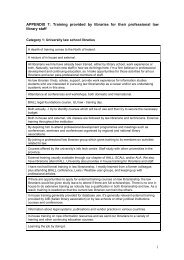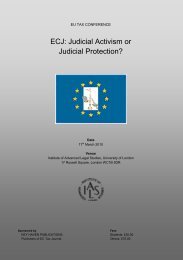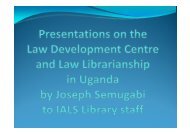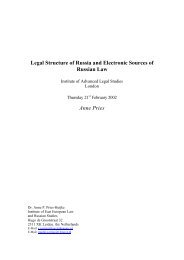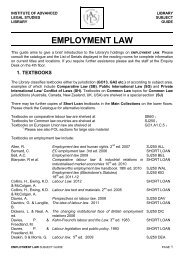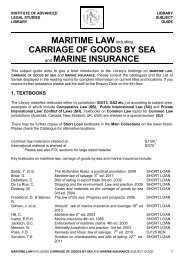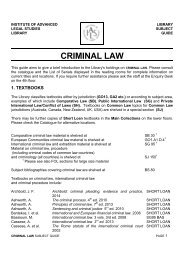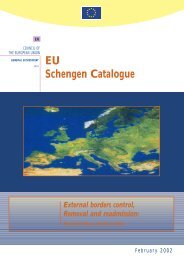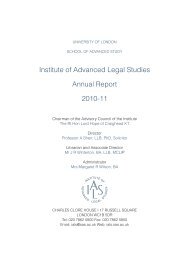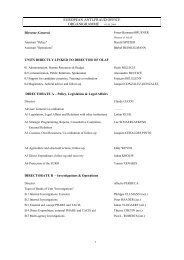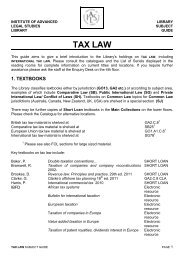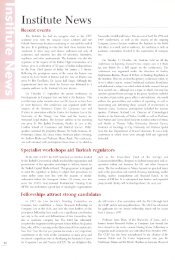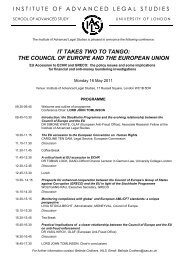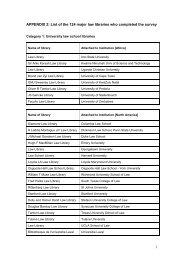a thesis - Institute of Advanced Legal Studies
a thesis - Institute of Advanced Legal Studies
a thesis - Institute of Advanced Legal Studies
Create successful ePaper yourself
Turn your PDF publications into a flip-book with our unique Google optimized e-Paper software.
RESULTING TRUSTS. 99<br />
4. Copyhold land is granted to A. and B., his wife, and C.,<br />
their son, to take in succession for their lives and the life <strong>of</strong> the<br />
survivor. A. pays the whole <strong>of</strong> the purchase-money. C. is not a<br />
trustee for A. Dyer v. Dyer (1788), 2 Cox, 92.<br />
5. A. enters into an agreement in the name <strong>of</strong> himself and his<br />
wife to purchase land, and dies before the whole <strong>of</strong> the purchasemoney<br />
is paid. The land belongs to the wife, and the remainder<br />
<strong>of</strong> the purchase-money must be paid out <strong>of</strong> A.'s estate. Drew v.<br />
Martin (1864), 2 H. & M. 130.<br />
6. A. buys debentures in a railway company in the name <strong>of</strong><br />
himself, his wife, and X., one <strong>of</strong> the trustees <strong>of</strong> his marriage settlement.<br />
This is an advancement, and on A.'s death X. holds merely<br />
as trustee for the wife. In re Eykin's Trusts (1877), 6 Ch. D. 115.<br />
But again the circumstances <strong>of</strong> the case must be taken into<br />
consideration, and if these go to show that the purchaser did not<br />
intend a gift, the mere fact that the purchase is made in the name<br />
<strong>of</strong> a wife or child is not sufficient to rebut the presumption <strong>of</strong> a<br />
resulting trust. (Marshal v. Crutwett (1875), L. E. 20 Eq. 328.)<br />
It is doubtful whether this presumption <strong>of</strong> advancement applies in<br />
the case <strong>of</strong> a purchase by a mother in the name <strong>of</strong> a child, although<br />
the better opinion seems to be that it does. It seems to have been<br />
assumed that it did in Garrctt v. Wilkinson (1848, 2 De Gr. & Sm.<br />
at p. 246), and so decided in Say re v. Hughes (1868, L. E. 5 Eq.<br />
376), and that it did not in In re De Viame (1863, 2 D. J. & S. 17),<br />
and in Sennet v. Sennet (1879, 10 Ch. D. 474), where Sir Greorge<br />
Jessel says: "In the case <strong>of</strong> a father you have only to prove the<br />
fact that he is the father, and when you have done that the<br />
obligation at once arises ; but in the case <strong>of</strong> a person in locoparentis<br />
you must prove that he took upon himself the obligation. But in<br />
our law there is no moral obligation—I do not know how to express<br />
it more shortly—no obligation according to the rules <strong>of</strong> equity—<br />
on a mother to provide for her child: there is no such obligation<br />
as a court <strong>of</strong> equity recognizes as such." Since this was said<br />
s. 21 <strong>of</strong> the Married Women's Property Act, 1882, has made a<br />
married woman having separate property subject to the same<br />
liability for the maintenance <strong>of</strong> her children as the husband is.<br />
This is perhaps not material, since the presumption in the case <strong>of</strong><br />
H 2



